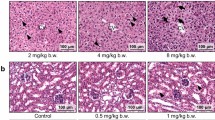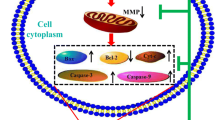Abstract.
Ochratoxin A (OTA) is a mycotoxin produced by Aspergillus ochraceus as well as other moulds. This mycotoxin contaminates animal feed and food. OTA is immunosuppressive, genotoxic, teratogenic, carcinogenic and is nephrotoxic in all animal species studied so far. OTA inhibits protein synthesis and induces lipid peroxidation. Since it seems impossible to avoid completely contamination of foodstuffs by toxigenic fungi, it is necessary to investigate the possible ways of limiting such toxicity. An attempt to prevent OTA-induced nephrotoxic and genotoxic effects, mainly the karyomegaly, has been made in vivo using aspartame (L-aspartyl-L-phenylalanine methyl ester), a structural analogue of both OTA and phenylalanine. Aspartame (25 mg/kg body weight) prevented most of the nephrotoxic effects induced by OTA (289 µg/kg body weight). It also showed some utility in preventing morphological and histological damage, mainly the karyomegaly. The protective effects of aspartame on OTA-induced nephrotoxicity could be based on several mechanisms related to competitive binding to plasma proteins, to transport or tissue distribution in the kidney or to the elimination of the toxin in the urine.
Similar content being viewed by others
Author information
Authors and Affiliations
Additional information
Electronic Publication
Rights and permissions
About this article
Cite this article
, ., , ., , . et al. Aspartame prevents the karyomegaly induced by ochratoxin A in rat kidney. Arch Toxicol 75, 176–183 (2001). https://doi.org/10.1007/s002040100229
Received:
Accepted:
Issue Date:
DOI: https://doi.org/10.1007/s002040100229




